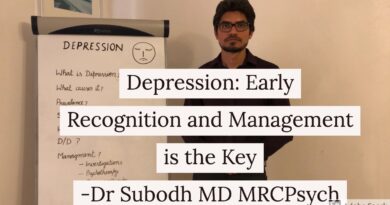The Impact of Depression on Physical Health: What You Need to Know
The Impact of Depression on Physical Health: What You Need to Know
Depression is a serious mental health condition that affects millions of people worldwide. It can have a profound impact on a person’s emotional well-being, and it can also take a toll on their physical health. In this article, we will explore the ways in which depression can affect the body and what you need to know about it.
Physical Health Effects of Depression
Depression doesn’t just affect the mind – it can also have a significant impact on the body. Some of the physical health effects of depression include:
- Increased risk of heart disease: Studies have shown that depression is linked to an increased risk of heart disease. The stress and inflammation associated with depression can contribute to heart problems.
- Weakened immune system: Chronic stress from depression can weaken the immune system, making a person more susceptible to infections and illnesses.
- Pain sensitivity: People with depression often experience heightened sensitivity to physical pain. This can make chronic pain conditions even more difficult to manage.
- Sleep disturbances: Depression can disrupt sleep patterns, leading to insomnia or excessive sleeping. This can further exacerbate physical health problems.
- Changes in appetite: Depression can cause changes in appetite, leading to weight gain or loss. This can impact overall health and increase the risk of developing other illnesses.
- Increased risk of substance abuse: Many people with depression turn to alcohol or drugs as a way to cope with their symptoms. This can lead to substance abuse issues and further damage to physical health.
Why It’s Important to Address the Physical Health Impact of Depression
While it’s crucial to address the mental health symptoms of depression, it’s equally important to recognize and address the physical health impact of the condition. Ignoring the physical effects of depression can lead to a worsening of overall health and an increased risk of developing chronic illnesses.
By recognizing the physical health impact of depression, individuals can seek appropriate treatment and support to manage both their mental and physical symptoms. This can ultimately improve their overall quality of life and reduce the risk of developing serious health problems.
Conclusion
Depression is a complex and multifaceted condition that can have a significant impact on a person’s physical health. From an increased risk of heart disease to weakened immune function, the physical health effects of depression are undeniable. It’s crucial for healthcare providers and individuals alike to recognize and address these effects in order to provide comprehensive care and support for those with depression.
FAQs
Q: Can depression cause physical pain?
A: Yes, depression is often associated with increased sensitivity to physical pain, which can make chronic pain conditions more difficult to manage.
Q: How can I address the physical health effects of depression?
A: It’s important to work with a healthcare provider to develop a comprehensive treatment plan that addresses both the mental and physical health effects of depression. This may include therapy, medication, and lifestyle changes.
Q: Are there lifestyle changes that can help improve physical health in depression?
A: Yes, regular exercise, a balanced diet, and adequate sleep can all help improve physical health in individuals with depression.



